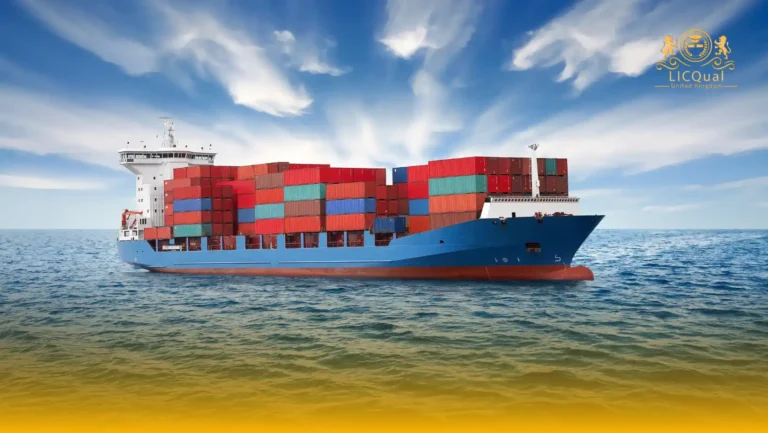The LICQual UK Level 3 Diploma in Shipping Operations and Management is a globally recognized qualification designed for learners who want to build a strong foundation in the shipping, logistics, and maritime management sector. Accredited in the UK, this shipping operations and management course provides the essential knowledge and practical skills needed to succeed in one of the world’s most dynamic industries.
Shipping and logistics are at the heart of international trade, and employers are actively seeking professionals who understand cargo handling, port operations, supply chain processes, and maritime law. This UK-accredited shipping and logistics diploma equips learners with the expertise to manage shipping operations effectively, ensuring smooth coordination between ports, vessels, and global trade networks.
What makes this program unique is its balance of academic knowledge and real-world application. From understanding the fundamentals of maritime operations and port management to exploring the complexities of global trade and shipping management, students gain career-ready skills that are directly aligned with industry needs. Whether you are new to the sector or looking to advance your career, this Level 3 Diploma in Shipping Operations and Management UK offers a clear pathway to professional growth.
Graduates of this program can pursue diverse roles in shipping management, logistics coordination, freight forwarding, and supply chain operations. With its UK-recognized accreditation, the diploma not only enhances employability but also opens doors to higher-level qualifications in maritime and logistics studies.
If you are ready to take the next step in your career, this international diploma in shipping and logistics is your opportunity to gain a competitive edge.
Course Overview
Qualification Title
LICQual UK Level 3 Diploma in Shipping Operations and Management
Total Units
6
Total Credits
60
GLH
240
Qualification #
LICQ2201281
Qualification Specification
To enroll in the LICQual UK Level 3 Diploma in Shipping Operations and Management, applicants must meet the following criteria:
|
Qualification# |
Unit Title |
Credits |
GLH |
|---|---|---|---|
|
LICQ2201281-1 |
Introduction to Shipping and Maritime Industry |
10 |
40 |
|
LICQ2201281-2 |
Principles of Shipping Operations |
10 |
40 |
|
LICQ2201281-3 |
International Trade and Logistics |
10 |
40 |
|
LICQ2201281-4 |
Maritime Law and Shipping Regulations |
10 |
40 |
|
LICQ2201281-5 |
Port and Terminal Management Shipping |
10 |
40 |
|
LICQ2201281-6 |
Management and Career Development |
10 |
40 |
By the end of this course, learners will be able to:
1. Introduction to Shipping and Maritime Industry
Learners will be able to:
- Explain the structure and global importance of the shipping and maritime industry.
- Identify key stakeholders including shipping companies, port authorities, and regulatory bodies.
- Describe the role of shipping in international trade and economic development.
- Recognize different types of vessels and their functions in maritime transport.
- Analyze current trends and challenges in global shipping operations.
- Demonstrate awareness of career pathways within the maritime and logistics sector.
2. Principles of Shipping Operations
Learners will be able to:
- Understand the fundamentals of vessel operations, cargo handling, and freight forwarding.
- Apply knowledge of shipping documentation such as bills of lading and charter parties.
- Explain the processes involved in loading, stowage, and discharge of cargo.
- Evaluate the importance of safety, security, and compliance in shipping operations.
- Demonstrate knowledge of shipping routes, schedules, and operational planning.
- Assess the role of technology in improving efficiency in shipping operations.
3. International Trade and Logistics
Learners will be able to:
- Explain the relationship between international trade, shipping, and logistics management.
- Identify major global trade routes and their impact on shipping operations.
- Apply knowledge of supply chain processes, warehousing, and distribution systems.
- Evaluate the role of Incoterms, customs procedures, and trade documentation.
- Analyze the challenges of global logistics including cost, time, and risk management.
- Demonstrate understanding of multimodal transport and integrated logistics solutions.
4. Maritime Law and Shipping Regulations
Learners will be able to:
- Understand the framework of international maritime law and conventions (IMO, SOLAS, MARPOL).
- Apply knowledge of shipping contracts, liabilities, and insurance requirements.
- Explain the legal responsibilities of shipowners, charterers, and cargo interests.
- Evaluate compliance requirements for safety, security, and environmental protection.
- Analyze case studies of maritime disputes and regulatory enforcement.
- Demonstrate awareness of ethical and legal standards in global shipping operations.
5. Port and Terminal Management
Learners will be able to:
- Explain the functions and operations of ports, terminals, and cargo handling facilities.
- Apply knowledge of port logistics, container management, and storage systems.
- Evaluate the role of technology and automation in modern port operations.
- Assess the importance of safety, security, and environmental management in ports.
- Analyze the economic and strategic role of ports in global trade.
- Demonstrate skills in planning and managing efficient port and terminal operations.
6. Shipping Management and Career Development
Learners will be able to:
- Apply management principles to shipping and logistics organizations.
- Demonstrate leadership, communication, and problem‑solving skills in maritime contexts.
- Evaluate strategies for career growth and professional development in shipping.
- Understand the role of human resource management in shipping operations.
- Analyze the impact of globalization and digitalization on shipping careers.
- Develop a personal career plan aligned with opportunities in the shipping and logistics sector.
The LICQual UK Level 3 Diploma in Shipping Operations and Management is designed for learners who want to build a career in the global shipping, logistics, and maritime industry. This internationally recognized qualification is ideal for beginners, career changers, and professionals seeking to strengthen their knowledge of shipping operations, port management, and international trade. Whether you are aiming for entry‑level roles or planning to progress into higher studies, this diploma provides the skills and confidence to succeed in the shipping and logistics sector.
1. Aspiring Shipping and Logistics Professionals
- Individuals seeking to start a career in shipping operations and maritime management.
- Learners who want to understand the fundamentals of global trade and logistics.
- Students aiming to enter the shipping, freight forwarding, or supply chain industry.
- Those looking for a UK‑accredited qualification to boost employability.
- Candidates who want to gain practical knowledge of shipping documentation and cargo handling.
2. School Leavers and College Graduates
- Students completing secondary education and looking for a professional pathway.
- Learners who want to enter the shipping and logistics industry without prior experience.
- Graduates seeking a recognized Level 3 qualification to enhance their CV.
- Individuals interested in international trade, port operations, and maritime studies.
- Young learners aiming to progress to higher‑level diplomas in shipping management.
3. Career Changers Entering the Maritime Sector
- Professionals from other industries who want to transition into shipping and logistics.
- Individuals seeking a structured introduction to maritime operations and management.
- Those looking for a qualification that supports career mobility into global trade.
- Learners aiming to develop transferable skills in supply chain and logistics.
- Candidates who want to explore new opportunities in international shipping.
4. Entry‑Level Employees in Shipping and Logistics
- Staff working in freight forwarding, port operations, or logistics support roles.
- Employees who want to formalize their knowledge with a recognized diploma.
- Individuals aiming to progress into supervisory or management positions.
- Workers seeking to strengthen their understanding of maritime law and compliance.
- Professionals who want to improve efficiency and career prospects in shipping.
5. International Students and Global Learners
- Learners outside the UK seeking an internationally recognized shipping qualification.
- Students aiming to build a career in global trade, logistics, and maritime management.
- Candidates who want to study a UK‑accredited diploma for international credibility.
- Individuals preparing for careers in ports, shipping companies, or logistics firms worldwide.
- Learners who want flexible study options aligned with international standards.
6. Entrepreneurs and Business Owners in Trade and Logistics
- Small business owners involved in import/export and global trade.
- Entrepreneurs seeking to understand shipping operations and supply chain management.
- Individuals aiming to reduce costs and improve efficiency in logistics.
- Business professionals who want to expand into maritime and freight forwarding.
- Owners looking for practical knowledge of shipping documentation and compliance.
Assessment and Verification
All units within this qualification are subject to internal assessment by the approved centre and external verification by LICQual. The qualification follows a criterion-referenced assessment approach, ensuring that learners meet all specified learning outcomes.
To achieve a ‘Pass’ in any unit, learners must provide valid, sufficient, and authentic evidence demonstrating their attainment of all learning outcomes and compliance with the prescribed assessment criteria. The Assessor is responsible for evaluating the evidence and determining whether the learner has successfully met the required standards.
Assessors must maintain a clear and comprehensive audit trail, documenting the basis for their assessment decisions to ensure transparency, consistency, and compliance with quality assurance requirements.







